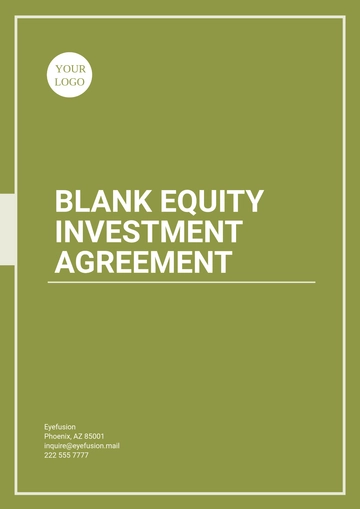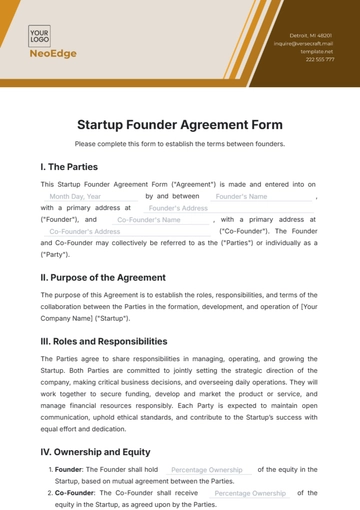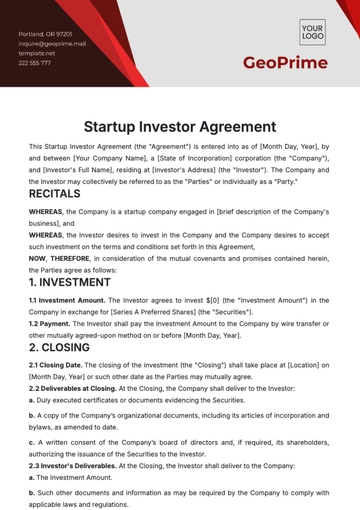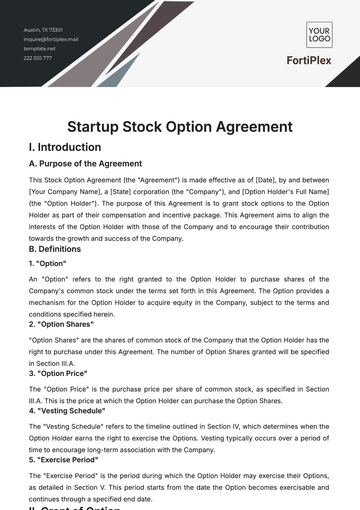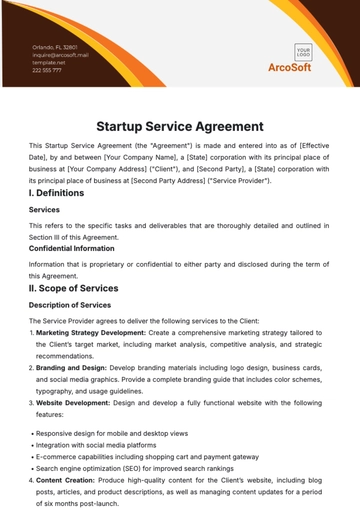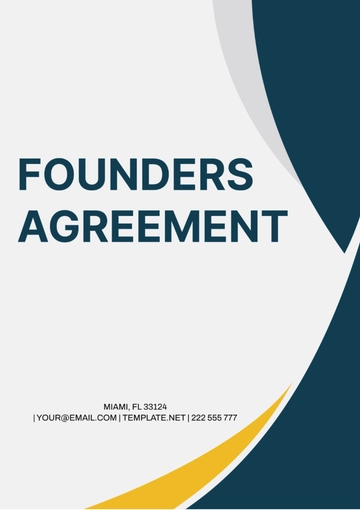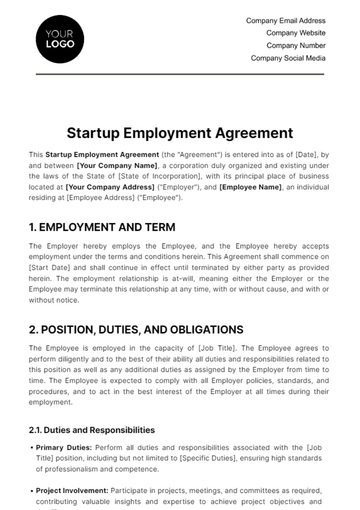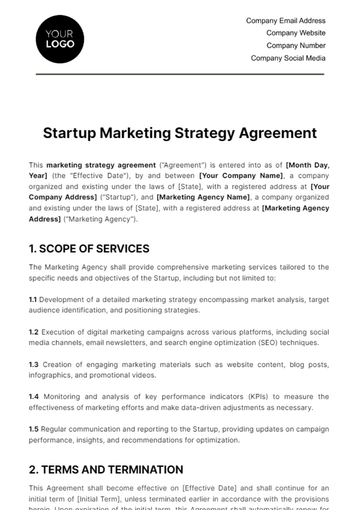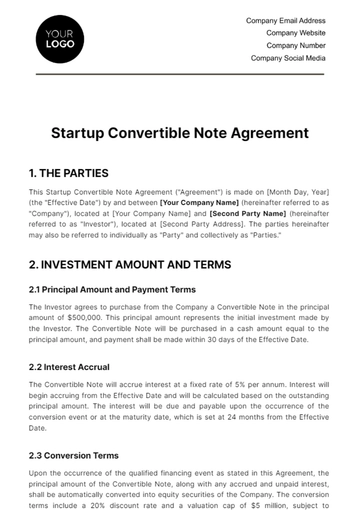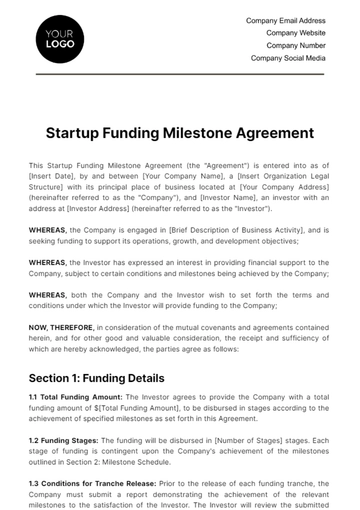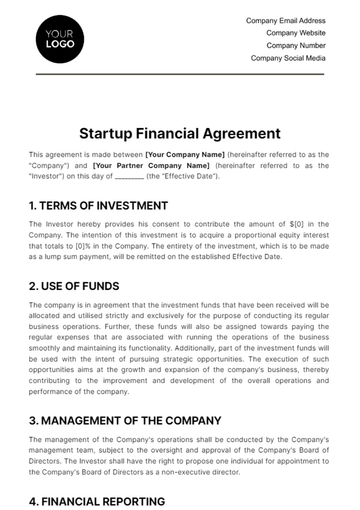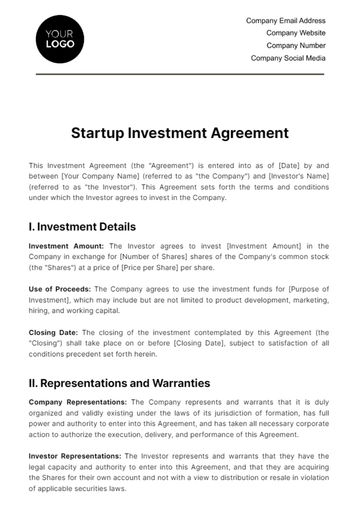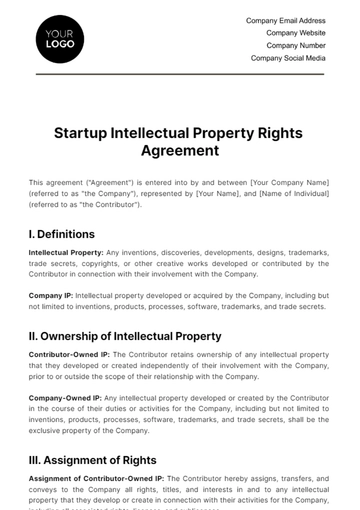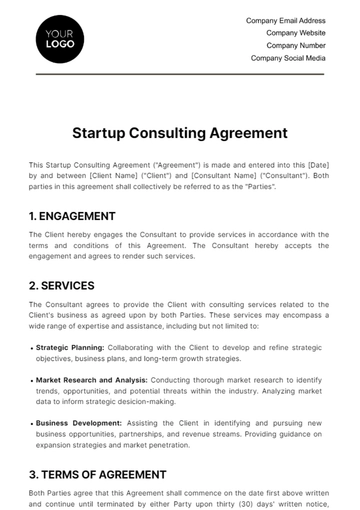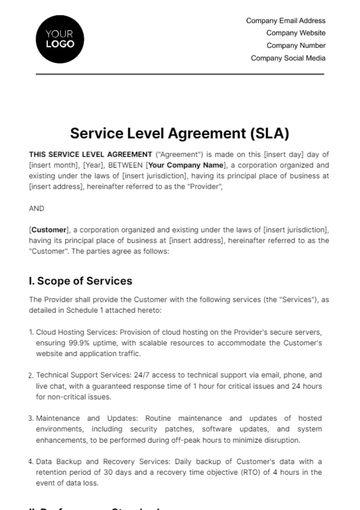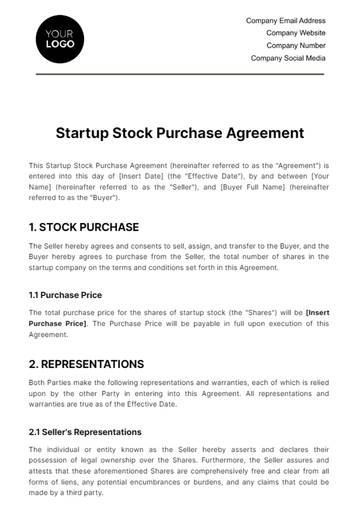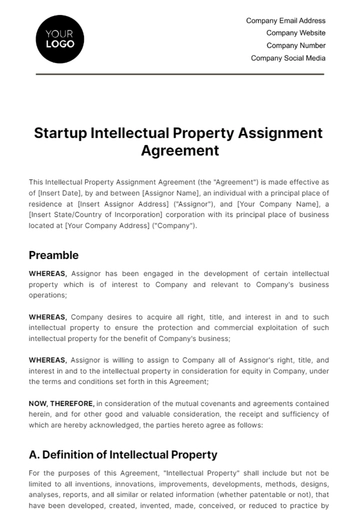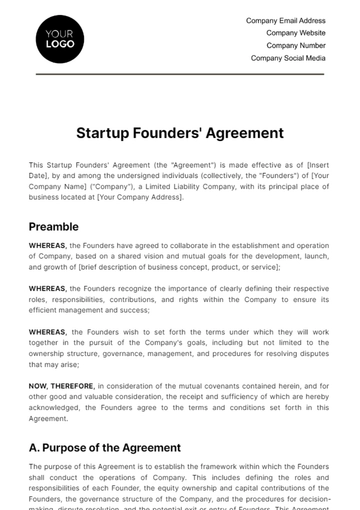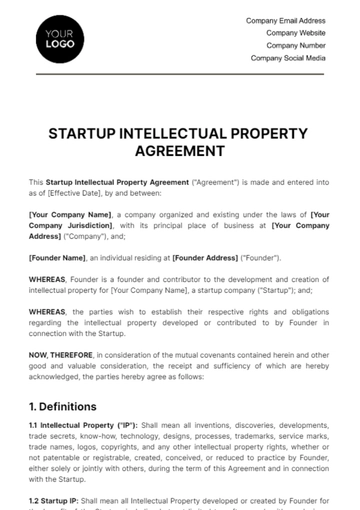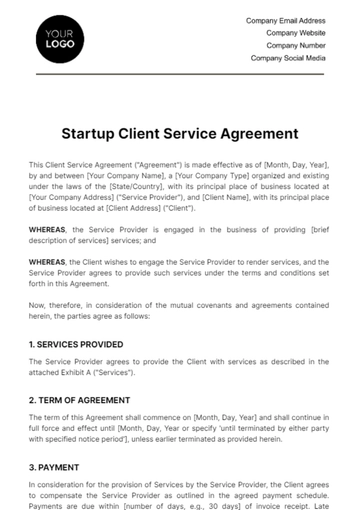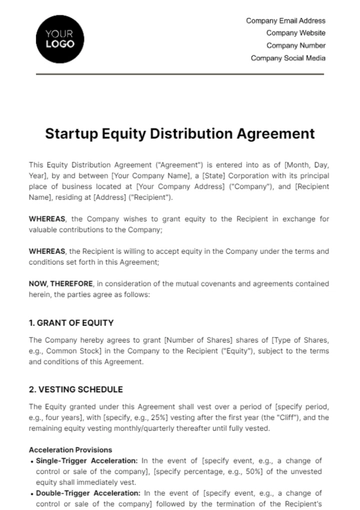Free Startup Employment Agreement
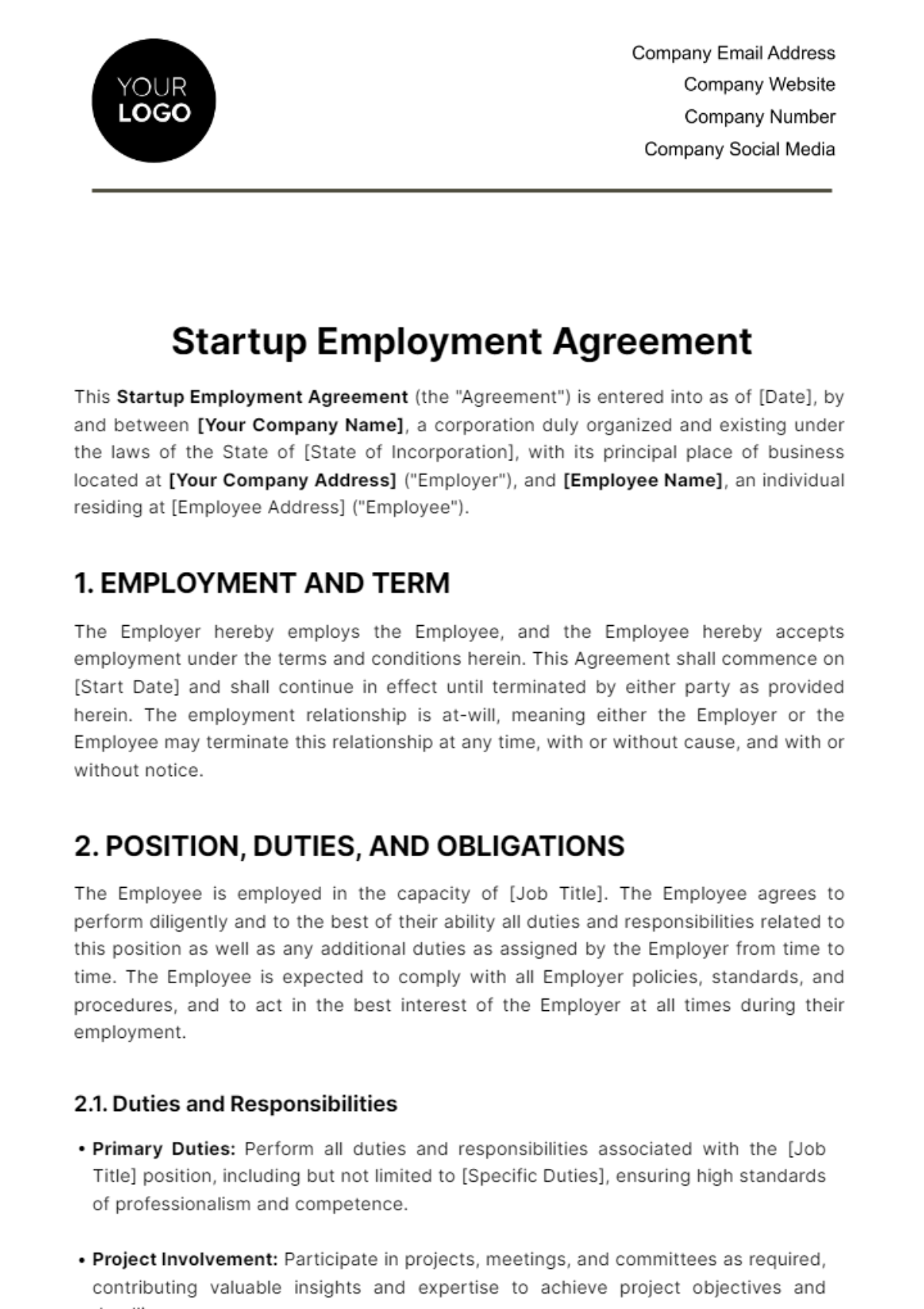
This Startup Employment Agreement (the "Agreement") is entered into as of [Date], by and between [Your Company Name], a corporation duly organized and existing under the laws of the State of [State of Incorporation], with its principal place of business located at [Your Company Address] ("Employer"), and [Employee Name], an individual residing at [Employee Address] ("Employee").
1. EMPLOYMENT AND TERM
The Employer hereby employs the Employee, and the Employee hereby accepts employment under the terms and conditions herein. This Agreement shall commence on [Start Date] and shall continue in effect until terminated by either party as provided herein. The employment relationship is at-will, meaning either the Employer or the Employee may terminate this relationship at any time, with or without cause, and with or without notice.
2. POSITION, DUTIES, AND OBLIGATIONS
The Employee is employed in the capacity of [Job Title]. The Employee agrees to perform diligently and to the best of their ability all duties and responsibilities related to this position as well as any additional duties as assigned by the Employer from time to time. The Employee is expected to comply with all Employer policies, standards, and procedures, and to act in the best interest of the Employer at all times during their employment.
2.1. Duties and Responsibilities
Primary Duties: Perform all duties and responsibilities associated with the [Job Title] position, including but not limited to [Specific Duties], ensuring high standards of professionalism and competence.
Project Involvement: Participate in projects, meetings, and committees as required, contributing valuable insights and expertise to achieve project objectives and deadlines.
Continuous Improvement: Actively seek ways to improve processes, enhance efficiency, and contribute to the overall success of [Your Company Name].
Additional Duties: Undertake any additional tasks or duties as assigned by the Employer, which may arise due to the evolving needs of the company.
2.2. Employer Policies, Standards, and Procedures
Code of Conduct: Adhere to the company's Code of Conduct, which outlines the expected behavioral standards, including honesty, integrity, respect for others, and compliance with all applicable laws and regulations.
Confidentiality Policy: Maintain the confidentiality of all proprietary and sensitive information, safeguarding it against unauthorized disclosure or use.
Data Protection: Comply with policies related to the protection of personal and sensitive data, in alignment with [Applicable Data Protection Laws], ensuring data privacy and security.
Health and Safety: Follow all health and safety guidelines and procedures to ensure a safe working environment for all employees. This includes reporting any hazards, incidents, or near misses.
Equal Opportunity and Anti-Discrimination: Support and adhere to the company's commitment to equal opportunity employment, non-discrimination, and harassment-free workplace practices.
Performance Review Process: Participate in the company’s performance review process, which is conducted [Frequency of Performance Reviews], to assess performance, set goals, and discuss career development opportunities.
Attendance and Punctuality: Ensure regular attendance and punctuality in accordance with the assigned work schedule. Absences must be reported in accordance with the company's attendance policy.
Dress Code: Follow the company's dress code policy, dressing in a manner that is appropriate for your role, the work setting, and in line with any safety requirements.
Technology Use: Utilize company technology and digital tools responsibly and ethically, adhering to policies regarding acceptable use, cybersecurity, and data handling.
Social Media: Adhere to the company’s social media policy, ensuring that any public activity or posts do not negatively impact the company's image or confidentiality requirements.
2.3. Acting in the Best Interest of the Employer
Conflict of Interest: Avoid any activities, investments, or associations that conflict with the interests of [Your Company Name] or compromise the ability to perform job duties impartially.
Representation of the Company: When acting in an official capacity or representing [Your Company Name] in public forums, ensure conduct is professional and aligns with the company’s values and objectives.
3. COMPENSATION, BENEFITS, AND PERFORMANCE REVIEWS
This section outlines the key components of our approach to remunerating, supporting, and evaluating our employees, ensuring they feel valued and motivated to achieve their best. Through competitive compensation, a robust benefits offering, and a transparent performance review system, we aim to foster a productive and rewarding working environment that aligns with our company's goals and the individual aspirations of our team members.
3.1. Compensation
The Employer shall compensate the Employee with an annual salary of [Salary Amount], reflecting the value of the skills, contributions, and duties performed by the Employee.
This salary is payable bi-weekly, consisting of [Number of Pay Periods] pay periods per year, in accordance with the Employer's standard payroll practices.
The Employer may offer performance-based bonuses, commission structures, or incentive programs designed to reward exceptional performance and contributions towards the company's objectives. Details of such programs will be communicated separately and may be subject to change at the discretion of the Employer.
3.2. Benefits
The Employee will be eligible for a comprehensive benefits package designed to support the well-being of our employees and their families. This package includes, but is not limited to:
Health Insurance: Coverage options for medical, dental, and vision care. The Employer contributes a portion of the premiums, with specific details and eligibility criteria outlined in the employee benefits guide.
Retirement Plans: Access to a [401(k), pension plan, etc.] with an employer match program to help employees save for retirement. Contribution limits and matching details are available in the retirement plan documentation.
Paid Time Off (PTO): A generous PTO policy that includes vacation, sick leave, and personal days. The accrual rate and maximum carry-over provisions are detailed in the PTO policy.
Professional Development: Opportunities for professional growth, including access to training programs, workshops, and educational assistance for courses relevant to the Employee's role and career aspirations.
Work-Life Balance Programs: Flexible working arrangements, remote work options, and employee assistance programs designed to support the balance between work and personal life.
All benefits are subject to the terms and conditions of each benefits program, including waiting periods, eligibility requirements, and coverage limits. Employees will receive detailed benefits documentation upon enrollment.
3.3. Performance Reviews
The Employee's performance and compensation will be reviewed at least annually to ensure alignment with company goals, individual contributions, and market standards. The performance review process includes:
Objective Setting: At the beginning of each review period, the Employee and their supervisor will set clear, measurable objectives aligned with the company's strategic goals.
Ongoing Feedback: Regular check-ins will be conducted to provide the Employee with feedback on performance, address challenges, and discuss progress towards objectives.
Annual Review Meeting: A formal review meeting to evaluate the Employee's overall performance against the set objectives, discuss achievements, areas for improvement, and career development opportunities.
Compensation Adjustment: Based on the outcome of the performance review, adjustments to the Employee's salary or benefits package may be considered to reflect their contributions, performance, and the current market conditions.
The Employer is committed to a transparent and fair performance review process, aiming to foster professional growth and recognize the valuable contributions of our employees. Participation in the performance review process is mandatory and considered an integral part of the Employee's role within [Your Company Name].
4. CONFIDENTIAL INFORMATION AND INTELLECTUAL PROPERTY
This section delineates the responsibilities and expectations placed upon the Employee regarding the handling, use, and protection of the Employer's confidential information and intellectual property assets. Through strict adherence to these guidelines, we aim to foster an environment of trust and mutual respect, ensuring the long-term success and innovation capacity of our company.
4.1. Confidential Information
The Employee acknowledges that during the course of employment, they will have access to and become acquainted with various types of confidential and proprietary information. This includes, but is not limited to:
Proprietary Information: Unique and proprietary knowledge inherent to the Employer's products, services, and operations.
Trade Secrets: Information including, but not limited to, formulas, practices, processes, designs, instruments, patterns, or compilations of information that are used in the Employer's business and give the company an opportunity to obtain an advantage over competitors who do not know or use it.
Patents and Copyrights: Innovations, creations, and writings that are protected by intellectual property laws.
Trademarks: Symbols, names, and slogans used to identify the Employer's goods and services.
Business Strategies: Plans, internal policies, and procedures for the development, production, distribution, and marketing of products and services.
Customer Information: Data about customers including, but not limited to, lists, preferences, agreements, and communications.
The Employee agrees to maintain the confidentiality of all such information, both during and after their employment, and not to disclose, use, or permit the use of any confidential information except as required in the performance of their duties for the Employer or as expressly authorized in writing by the Employer.
4.2. Intellectual Property
Work Product Ownership: All work products, inventions, designs, and innovations that the Employee conceives, develops, or contributes to during the period of employment, whether individually or as part of a team, and that are related to the Employer's business operations or objectives, shall be the sole and exclusive property of the Employer.
Disclosure and Assignment: The Employee agrees to promptly disclose such work products, inventions, designs, and innovations to the Employer and to execute any and all applications, assignments, or other instruments that the Employer deems necessary to protect its ownership interests.
Return of Property: Upon termination of employment, or at the Employer's request at any time, the Employee shall return all materials, documents, and electronic data, including copies, that contain or pertain to confidential information or intellectual property.
4.3. Protection and Enforcement
Legal Obligations: The Employee understands that unauthorized disclosure or use of confidential information or infringement of intellectual property rights may subject them to legal action by the Employer, including but not limited to injunctive relief, damages, and attorney's fees.
Cooperation: The Employee agrees to cooperate with the Employer in obtaining and enforcing intellectual property rights and confidentiality protections for such proprietary information and work products.
5. TERMINATION CONDITIONS
This section outlines the conditions under which this employment relationship between [Your Company Name] ("Employer") and the Employee may be terminated. Termination of employment is a significant action and is subject to the following terms to ensure clarity, fairness, and legal compliance.
5.1. Notice Period
Voluntary Termination by Employee: The Employee may decide to terminate their employment with the Employer for any reason. In such cases, the Employee is required to provide the Employer with [Notice Period] written notice. This allows the Employer sufficient time to manage the transition, including the allocation of duties and the commencement of recruitment processes to find a suitable replacement.
Involuntary Termination by Employer: The Employer reserves the right to terminate the employment relationship at any time. However, except for termination for cause, the Employer will provide the Employee with [Notice Period] written notice or pay in lieu of notice.
5.2. Termination for Cause
The Employer may terminate the employment relationship immediately and without notice for cause, which includes, but is not limited to, the following circumstances:
Breach of Agreement: Any violation of the terms and conditions of this Agreement by the Employee.
Unsatisfactory Performance: Failure to perform job duties satisfactorily despite receiving feedback and the opportunity to improve.
Illegal Conduct: Engagement in illegal activities, including theft, fraud, embezzlement, or other criminal behavior that affects the Employer's operations or reputation.
Breach of Confidentiality: Unauthorized disclosure of the Employer's confidential or proprietary information.
5.3. Obligations Upon Termination
Upon termination of employment, for any reason, the Employee is obligated to:
Return of Property: Immediately return all property belonging to the Employer. This includes, but is not limited to, keys, access cards, equipment, documents, and electronic devices containing Employer data.
Confidential Information: Cease using and return or destroy all materials containing confidential information of the Employer. The obligation to maintain the confidentiality of such information extends beyond the termination of employment.
Debriefing Session: Participate in an exit interview or debriefing session, if requested by the Employer, to facilitate a smooth transition and handover of ongoing work and responsibilities.
5.4. Post-Termination Obligations
Non-Compete and Non-Solicitation: The Employee's obligations under any non-compete or non-solicitation agreements continue in full force as specified in those clauses, even after the termination of employment.
Final Pay: The Employee will receive their final paycheck, including compensation for accrued but unused paid time off (if applicable) and any other outstanding reimbursements or bonuses, in accordance with state laws and company policies.
5.5. Legal and Regulatory Compliance
Both the Employer and the Employee agree to adhere to all applicable laws and regulations governing the termination of employment, including those related to notice periods, severance pay, and the protection of proprietary rights and confidential information.
6. NON-COMPETE AND NON-SOLICITATION
For [Non-Compete Period] after the termination of employment, the Employee shall not directly or indirectly engage in any business that is in competition with the business of the Employer within [Geographical Area].
The Employee agrees not to solicit or induce any employee or contractor of the Employer to terminate or breach an employment, contractual, or other relationship with the Employer during and for [Non-Solicitation Period] after the termination of employment.
7. GOVERNING LAW AND DISPUTE RESOLUTION
This Agreement shall be governed by and construed in accordance with the laws of the State of [State], without regard to its conflict of laws principles. Any disputes arising under or related to this Agreement shall be resolved through binding arbitration in accordance with the rules of the American Arbitration Association.
8. Amendments and Waiver
No amendment or modification of this Agreement shall be deemed effective unless made in writing and signed by both parties. The waiver by either party of a breach of any provision of this Agreement shall not operate as or be construed to be a waiver of any subsequent breach.
9. Entire Agreement and Severability
This Agreement constitutes the entire agreement between the parties with respect to the subject matter hereof and supersedes all prior negotiations, understandings, and agreements between the parties. If any provision of this Agreement is held to be invalid, illegal, or unenforceable, the remaining provisions shall remain in full force and effect.
IN WITNESS WHEREOF, the parties have executed this Agreement as of the date first above written.
[Your Company Name]
By: [Your Signature]
Name: [Your Name]
Title: [Your Job Title]
Date: [Date]
[Employee Name]
Signature: [Signature]
Date: [Date]
- 100% Customizable, free editor
- Access 1 Million+ Templates, photo’s & graphics
- Download or share as a template
- Click and replace photos, graphics, text, backgrounds
- Resize, crop, AI write & more
- Access advanced editor
Template.net presents the Startup Employment Agreement Template; an innovative, fully editable, and customizable tool. This template allows you to streamline your contract generation process, all conveniently editable in our Ai Editor Tool. It's the perfect solution for marketing professionals wanting to create precise contracts. Experience efficiency, clarity, and professionalism like never before. Your startup deserves the best.
You may also like
- Lease Agreement
- Non Compete Agreement
- Rental Agreement
- Prenuptial Agreement
- Non Disclosure Agreement
- Operating Agreement
- Hold Harmless Agreement
- LLC Operating Agreement
- Arbitration Agreement
- Purchase Agreement
- Residential Lease Agreement
- Executive Agreement
- Confidentiality Agreement
- Contractor Agreement
- Partnership Agreement
- Postnuptial Agreement
- Collective Bargaining Agreement
- Loan Agreement
- Roommate Agreement
- Commercial Lease Agreement
- Separation Agreement
- Cohabitation Agreement
- Room Rental Agreement
- Child Custody Agreement
- Employee Agreement
- License Agreements
- Settlement Agreement
- Joint Venture Agreement
- Indemnity Agreement
- Subordination Agreement
- Sales Agreement
- Agreements Between Two Parties
- Business Agreement
- Real Estate Agreement
- HR Agreement
- Service Agreement
- Property Agreement
- Agreement Letter
- Restaurant Agreement
- Construction Agreement
- Finance Agreement
- Marketing Agreement
- Payment Agreement
- Investment Agreement
- Management Agreement
- Nonprofit Agreement
- Software Agreement
- Startup Agreement
- Agency Agreement
- Copyright Agreement
- Collaboration Agreement
- Reseller Agreement
- Car Rental Agreement
- Cleaning Services Agreement
- Consultant Agreement
- Deed Agreement
- Car Agreement
- Equipment Agreement
- Shares Agreement
- Data Sharing Agreement
- Advertising Agreement
- School Agreement
- Franchise Agreement
- Event Agreement
- Travel Agency Agreement
- Vehicle Agreement
- Board Resolution Agreement
- Land Agreement
- Binding Agreement
- Tenancy Agreement
- Exclusive Agreement
- Development Agreement
- Assignment Agreement
- Design Agreement
- Equity Agreement
- Mortgage Agreement
- Purchase and Sale Agreement
- Shareholder Agreement
- Vendor Agreement
- Royalty Agreement
- Vehicle Lease Agreement
- Hotel Agreement
- Tenant Agreement
- Artist Agreement
- Commission Agreement
- Consignment Agreement
- Debt Agreement
- Recruitment Agreement
- Training Agreement
- Transfer Agreement
- Apprenticeship Agreement
- IT and Software Agreement
- Referral Agreement
- Resolution Agreement
- Waiver Agreement
- Consent Agreement
- Partner Agreement
- Social Media Agreement
- Customer Agreement
- Credit Agreement
- Supply Agreement
- Agent Agreement
- Brand Agreement
- Law Firm Agreement
- Maintenance Agreement
- Mutual Agreement
- Retail Agreement
- Deposit Agreement
- Land Purchase Agreement
- Nursing Home Agreement
- Supplier Agreement
- Buy Sell Agreement
- Child Support Agreement
- Landlord Agreement
- Payment Plan Agreement
- Release Agreement
- Research Agreement
- Sponsorship Agreement
- Buyout Agreement
- Equipment Rental Agreement
- Farm Agreement
- Manufacturing Agreement
- Strategic Agreement
- Termination of Lease Agreement
- Compliance Agreement
- Family Agreement
- Interior Design Agreement
- Ownership Agreement
- Residential Lease Agreement
- Retainer Agreement
- Trade Agreement
- University Agreement
- Broker Agreement
- Dissolution Agreement
- Funding Agreement
- Hosting Agreement
- Investor Agreement
- Memorandum of Agreement
- Advisory Agreement
- Affiliate Agreement
- Freelancer Agreement
- Grant Agreement
- Master Service Agreement
- Parking Agreement
- Subscription Agreement
- Trust Agreement
- Cancellation Agreement
- Horse Agreement
- Influencer Agreement
- Membership Agreement
- Vacation Rental Agreement
- Wholesale Agreement
- Author Agreement
- Distributor Agreement
- Exchange Agreement
- Food Agreement
- Guarantee Agreement
- Installment Agreement
- Internship Agreement
- Music Agreement
- Severance Agreement
- Software Development Agreement
- Storage Agreement
- Facility Agreement
- Intercompany Agreement
- Lending Agreement
- Lodger Agreement
- Outsourcing Services Agreement
- Usage Agreement
- Assurance Agreement
- Photography Agreement
- Profit Sharing Agreement
- Relationship Agreement
- Rent To Own Agreement
- Repayment Agreement
- Volunteer Agreement
- Co Parenting Agreement
- HVAC Agreement
- Lawn Care Agreement
- SAAS Agreement
- Work from Home Agreement
- Coaching Agreement
- Protection Agreement
- Security Agreement
- Repair Agreement
- Agreements License
